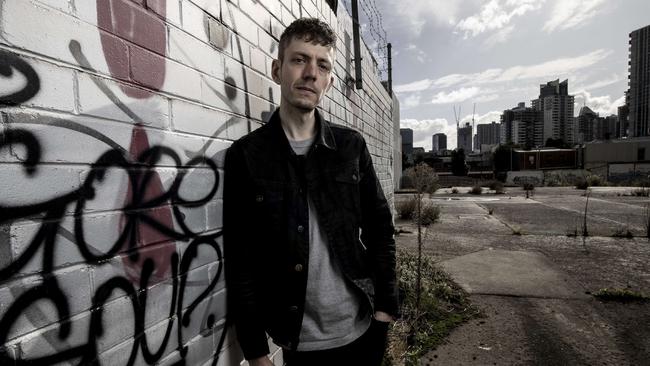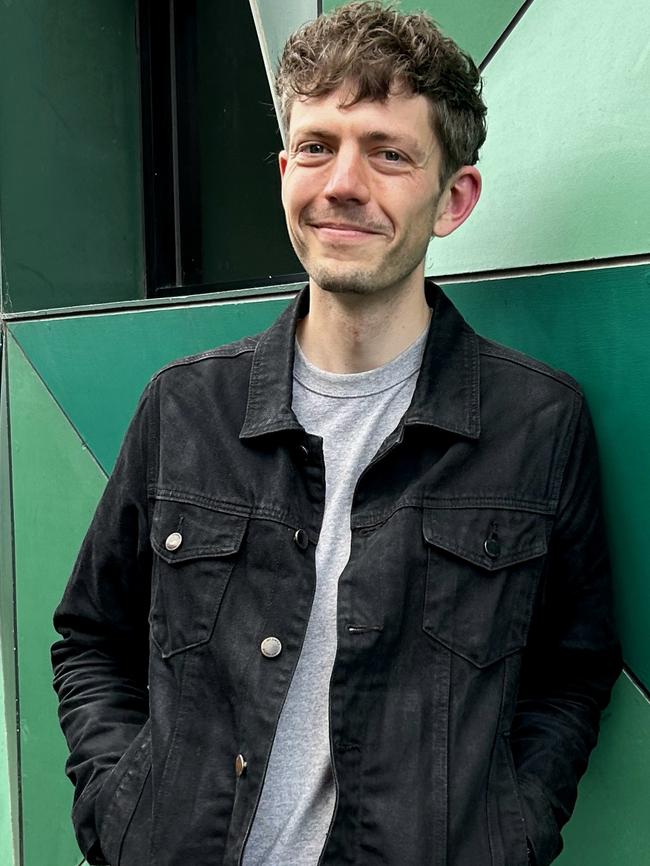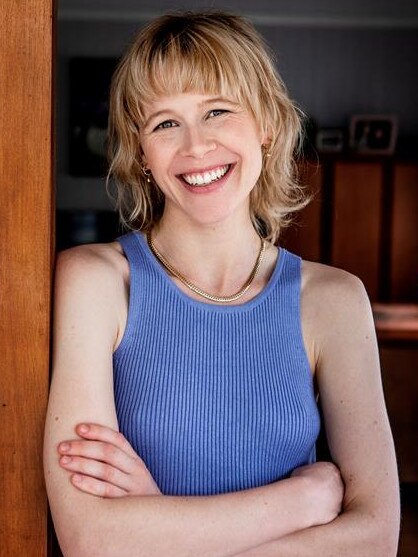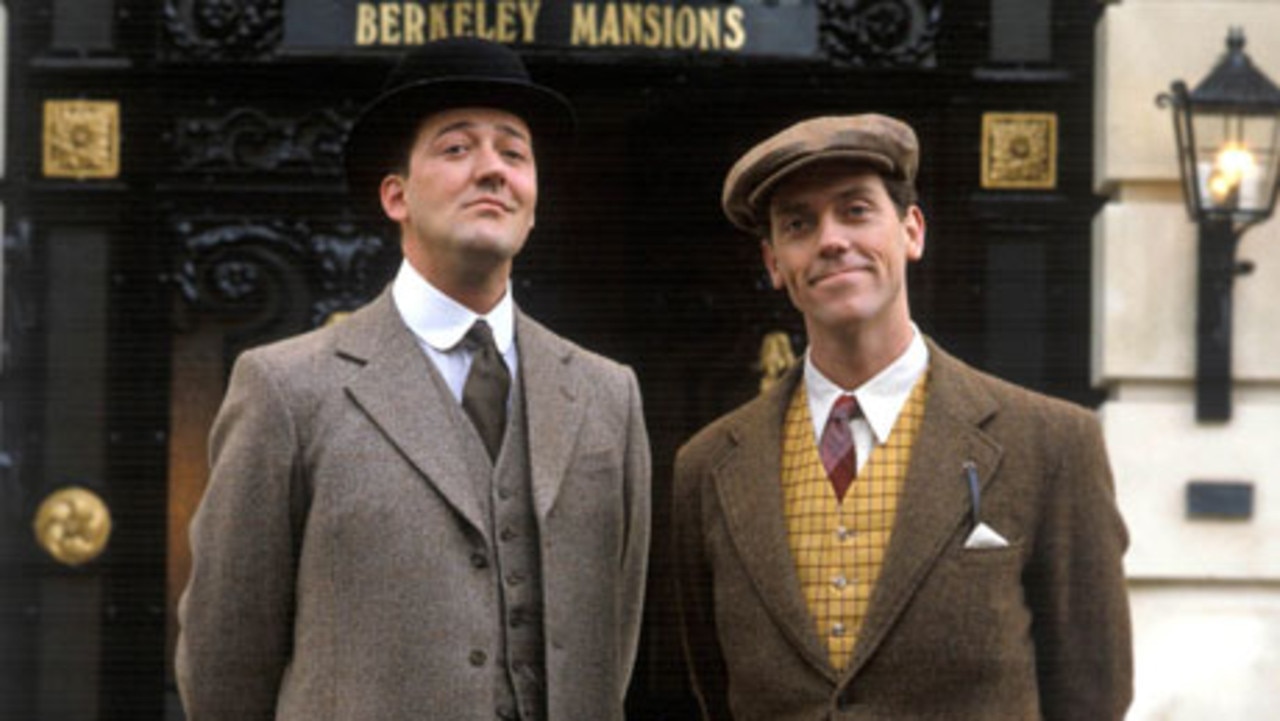The Australian/Vogel’s Literary Award 2023 shortlist named
Three brilliant young writers have made the cut. Their prose blew our socks off. We want them to go on to have the same success as previous winners, among them Tim Winton, Kate Grenville and Gillian Meares.

Today we announce the shortlist for The Australian/Vogel’s Prize. Three brilliant young writers are featured. Their prose blew our socks off. We want them to go on to have the same success as previous winners, among them Tim Winton, Kate Grenville and Gillian Meares. As a judge of the prize for the past two years, I can promise you the standard of entries is very high. It’s an honour to present these extracts from the three shortlisted entries.
Nick Milde
Nick Milde, 33, is a Melbourne-based writer who says he has “an almost cliched appreciation for coffee, dogs and wearing mostly black.”
He has a BA for Writing and Creative Communications, and has worked for 10 years as a creative and copywriter in advertising agencies across both Melbourne and Adelaide. He has “knocked out” short fiction, written and shot short films, and co-created and performed in several live comedy shows. The last of these, The Human Show, took him and his co-writer to both the Adelaide and Edinburgh Fringe Festivals in 2019.
His entry is his first serious attempt at novel-length storytelling. He says the work is inspired in part by a love of travel and conversation, but also contemporary storytellers “who capture a sense of escapism to a place that isn’t necessarily comfortable, or better, or even that different, but that leaves you with a feeling you can’t help mulling over”.
Don’t they know it’s the end of the world?
Interview with a Farmer (or, The End of the World and its Impact on Agricultural Sustainability)
We have reached the End. There’s no going back.
Sorry, are we starting? Is that thing, uh, recording? Haven’t seen a camera like that for a long time; mostly I just use my phone. It’s seen better days an’ barely works out here most’f the time, but you know, good enough for as long as I’ll need it.
Anyway … when the news first came – what was it, six years ago now? Almost seven actually, I s’pose. Anyway, when we found out, I wasn’t sure what to think.
Was in town when I first heard; Freemont, that’s south from here. My friend Tom told me – known him years; he owned the hardware store, so we’d talk every couple weeks.
That day I made the drive down early to meet someone at the bank, and I remember how quiet it was out; streets were nearly empty.

Tom, he jogs over when he sees me parking the truck an’ he asks what I thought about all this, how Abbie’s taken things. I told him I didn’t know what I was s’posed to be thinking about, an’ he says, well, hadn’t we seen the news? That stopped me; he looked real beat up, you know, real tired. We hadn’t seen it, ‘course; Abbie an’ I’d gone to bed right after dinner knowing I was making the drive and there’d be things to do around the property before I left – we’d needed some parts ordered in for one of the harvesters actually, I told him.
Tom, he looks at me, then just says “Wow.” That’s all he’ll say for a minute, just “wow.”
I can see then he’s in a real state, so we sit on a bench. He’s staring at his hands, balling them up in his lap, like he’s not sure what they are even. I ask him again, what’s goin’ on Tom? What’s the problem? So it was Tom told me – how there’d been this special report, this big global conference; how all these experts had stood up in all these live crosses everywhere ‘round the world, how some had been real straight, matter of fact, or just not able to speak suddenly. How they’d known for about six months but wanted to be sure. How that was it; this was how it was.
An’ you know what I did then? I laughed. Tom sagging an’ shaking on this bench in the street, I laughed an’ shook my head, saying “Tom, what the heck movie were you watching?” That’s all this’d be, I told him; he’d just misunderstood somethin’ – maybe still somethin’ bad, but nothing so big. Tom’s not laughing though, and when he looks up, his eyes are … I don’t know, hollow, like he’s looking a hundred miles through me.
He tells me to look around – ‘why’s it so quiet, then?’
His eyes were makin’ me … I don’t know, uncomfortable, so I said I was late; had to make my meeting. Tom stayed sat there, didn’t move, so I left and ducked in the bank twenty minutes early. The person I was meeting though, they hadn’t come in to work.
The woman at reception says she’s sorry she didn’t think to call, but this guy hadn’t told anyone he wasn’t coming; nobody knew where he was. Can they call him at home, I ask, but they’ve tried, nobody’s picking up. Nearly no-one’s come in.
“It’s all just idiotic,” she says. “There’s no way it’s all true. No way”.
Anna McGahan
Anna McGahan, 34, is a writer and an actor, best known for playing Nellie Cameron on the television series, Underbelly: Razor (2011), as well as Rose Anderson in The Doctor Blake Mysteries (2015–2018).
Her poetry, essays and journalism have been published in numerous publications, including The Griffith Review and The Guardian. Her first book, Metanoia, was published by Acorn Press in 2019; she has also been awarded the Queensland Young Playwriting Award twice and was shortlisted for the Queensland Premier’s Drama Award for her play He’s Seeing Other People Now.
She was the winning recipient of Screen Queensland and SBS’s RIDE Pitch, and awarded funds to write her feature script The Ghost Light.
McGahan is also a spoken-word poet and is the 2022 Australian Poetry Slam Queensland champion. She comes from a literary family: her uncle Andrew McGahan won the 1991 Australian/Vogel’s prize for Praise. She lives in Meanjin/Brisbane with her two young daughters and says “it’s perfect chaos”.
Immaculate
Text messages from Lucas Harkin to his ex-wife Frances Kocsmaros, 3 November 2020:
I’m out front. Can you pack her togs, please. Also a spare pair of clothes. (09.42 am)
One missed call. (09.45 am)
Frances I’m in a hurry. (09.50 am)
I would like to put in writing that your behaviour at handover was entirely inappropriate and aggressive. (09.59 am)
■ ■ ■
The Gospel According to Frances 3:1
The psychologist hasn’t met my eyes yet. I have decided to come here a maximum of three times. This is the third.
She has framed stock images from Kmart on her wall and wears bad jewellery. I don’t trust anyone who thinks a photograph of a succulent is art.
‘I want to check on the homework from last week.’
She’s looking at me now, pen at the ready.
‘Ah, yeah, I emailed the questionnaire.’
‘And you were going to contact the support group, I think?’ ‘Yeah. I haven’t done that.’
She looks disappointed. Woman, I live to disappoint. Just ask my Hungarian mother.
‘They would be an incredibly useful resource regarding the next stage, be it treatment or remission. You can talk to other parents.’
‘We only had the latest scans a week ago. It’s just one day at a time for me.’
I can see her eyes drift to the clock on the wall, her patience faltering. I am reminded she has squeezed me in on a Saturday afternoon. Maybe she’s meant to be at a party, or a soccer game, or her own support group.
‘I really think you –’

‘Lucas already goes. So I can’t.’
She nods, processing. Concedes.
‘I’ve actually been meaning to ask – how have you managed to balance your separation with your Christian faith?’
I lunge at my own mind, grabbing for ideas in the dark. ‘Um, it’s been difficult.’
‘I can imagine. Do you feel supported by the community?’
I laugh so hard that I actually snort, and cross my legs so as not to wet myself. Do I feel supported?
She leans in, curious. All right, lady.
‘There are some people in the church community who see marriage as the outward manifestation of your faith, you know? So if you’re getting married, you’re kind of climbing the ladder to heaven. If you’re married with kids, you’re even closer. If you’re single, God must be working on your character. If you’re infertile, you’re having trust issues. If you have marriage problems … well, someone’s living in sin, because the covenant is your salvation. Even if staying feels like self-betrayal or abuse, it’s the most important thing. Leave your spouse and you might as well have left God. And once you’ve exited the institution of marriage – which is the bedrock of the church’s survival, because if you can’t control people with sex you can’t control them at all – once you’ve left the system, you just don’t fit into its trajectories anymore. You’ve done the forbidden thing, the unforgivable sin. You’ve eaten the apple. You know too much.’
‘So you feel guilt for leaving?’
‘No. I feel punished and abandoned.’
She cocks her head and tuts in an attempt at sympathy.
‘Your ex-husband worked for the church you attended, didn’t he?’
‘We both did. He was a teaching pastor. I worked in their street aid department. They had a program.’
‘I see. And you quit that job?’
‘I was dismissed quietly. He’s still there.’
‘Right.’ She takes notes. ‘What about joining a more progressive, open-minded church?’
‘I don’t want to. I don’t need Sunday anymore. I have other people I can talk to about spiritual or emotional things …’
‘Who?’
You? Celine? I don’t even consider telling her.
‘I mean, I have work. And bad TV. Baking a cake. Dancing. Watering plants. Buying cereal. Dreaming. Parenting. That’s church for me now.’
‘Dreaming?’
I didn’t mean to mention that. People don’t do Freud anymore. It’s hard to explain.
‘I have dreams, at night. Significant dreams.’
‘Like nightmares?’
‘No, dreams that have meaning. Dreams that show me what is happening. I used to think they were God trying to talk to me. Then I thought they were anxiety-induced. But they keep happening.’
‘What do you think they are now?’
‘A weird gift. A burden. The only mystical thing I’ve got left.’
Lily McCann
Lily McCann, 23, grew up in Tasmania’s gorgeous Huon Valley on a farm surrounded by “dogs, horses, chickens – but no TV”.
“Without Wii or DS, where was there to turn but to the bookshelves?” she says. McCann read Bob Graham and Mem Fox classics; she read Tolkien, Jane Austen and the Brontes, Tolstoy and Dostoevsky.
“I made my own stories too,” she says, “ever since I learned to staple together scribbled picture books as a small child, before I had learnt to write.”
Her entry, a collection of short stories, taps into the elements of fantasy and wonder that she has maintained since childhood.
McCann is in her second year of medicine at the University of Melbourne, having completed a Bachelor of Biomedicine and Diploma in Languages in 2021.
“But I have kept my writing alive,” she says. “I believe that medicine and writing complement one another to the mutual benefit of each. The reflectiveness and soul of writing enhance my appreciation of the ‘art of medicine’ – and my experiences within medicine expand my knowledge and capacity to write.”
We’ve included an edited extract from one of her short stories here.
“Collection of Endings” from THE DAUGHTER OF ELEVEN
There once was a small town that stood as a circle, and at the centre of that circle was a tall thin pillar, pointing up into the sky. The pillar cast a long shadow on the ground during the day, which stretched out across the town plaza and fell upon one of the houses that bordered it. As the sun tracked across the sky from morning to night the shadow orbited the pillar steadily, shifting from one house to the next around the town’s innermost promenade.
There were 12 grand Houses in this street that stood at equal distances from each other. The largest House was Number 12. It had a grand portico with pillars of stone and three shallow steps leading up to the door, which was painted black. When it was 12 o’clock, the shadow from the tall pillar fell directly on this door. Next to House Number 12 stood Number 1, a smaller abode painted in white with yellow window frames and a yellow knocker on its door. It had no portico, just a path leading straight to the door. The pillar’s shadow lay directly across this path and touched the door at 1 o’clock, once it had circled away from House Number 12 and covered the distance to its neighbour.
Next to House Number 1 was Number 2 and Number 2 was painted blue. It had a light blue door, the colour of the sky in the early afternoon, and at 2 o’clock this door lay under the shadow that had travelled by then from the door of Number 1. The door of Number 3 was darkened at 3 o’clock by the pillar’s shadow, and it was a deep pink colour, like the bare gums of a baby, while the colour of its neighbour, Number 4, was a very dark blue.
The door of Number 4 was in the pillar’s shadow at 4 in the afternoon. House Number 5 was a happy orange colour, darkened at the door by the shadow at 5 o’clock. Number 6 was a pale, pastel pink like the tint that lies over the sky at dawn when the sun first peeks its white face over the border of the earth, and it was around this time, at 6 o’clock in the morning, that the door of Number 6 lay in shadow.

There was a second time when the door of Number 6 was cast under the pillar’s shadow, just as the sun was descending again beyond the lip of the earth, for in this town the sun rose from and set at the same place, travelling across the whole sky in between in a wide, complete circle. And so the darkening of 6’s door marked the beginning and end of its daily orbit of the town.
Number 7 was purple, like the sky before night takes over and at 7 o’clock its door seemed almost black from the pillar’s shade. Number 8 was green, clover green, and at 8 o’clock it lay in shadow. Then there was Number 9, which was also orange; and Number 10 – a light, pale blue – and Number 11, made of dark grey stone … at 11 o’clock the shadow of the pillar darkened its wooden door and turned it black.
So stood all 12 Houses, each in their own place on the street that bordered the paved circle of the town centre. They were the 12 original Houses of the old town and they were numbered from 1 to 12.
The town of the great pillar had never seen a day of gloomy weather, for there the sky was always clear and no clouds had ever crossed it. The inhabitants of the town did not even know of the word ‘cloud’; nor were they aware of ‘storm’ or ‘rain’ or ‘snow’. The town knew no seasons, and for them nature was a plain canvas, ever the same, over which they painted their days in their own fashion, by their own will, bound only by the rules of time. For the town was governed by time; everyone knew their minute and lived by it to the second.
The owners of the 12 Houses were given by rule no distinct name but shared the name of their abode, as an honour of their status and a mark of their importance. And so, the owner of House Number 12 was called Twelve, the owner of Number 1, One and the owner of 2, Two.
The owner of House Number 6, known as Six, was the first in the town to start in the glimmer of the morning … When the shadow lay full over the door it swung slowly forward and its master emerged.




To join the conversation, please log in. Don't have an account? Register
Join the conversation, you are commenting as Logout